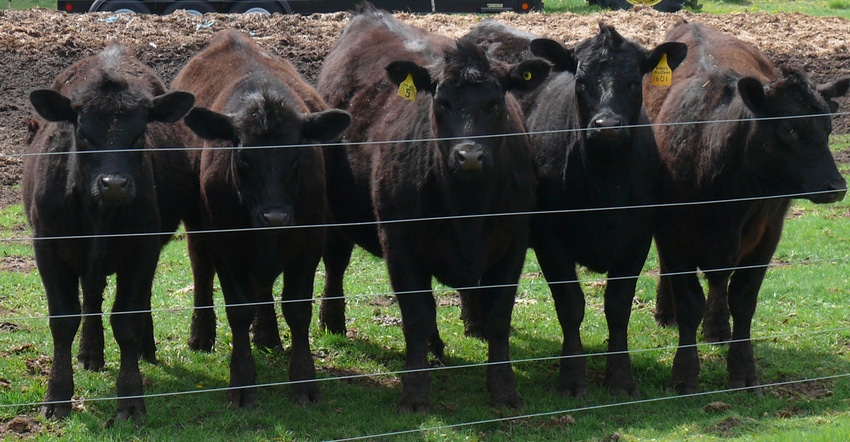May 11, 2017

By Alivia Roberts
Bovine tuberculosis has been a concern in the U.S. since the 1990s, and has specifically been on the minds of Indiana cattle producers in not only the last 10 years, but also over the past several months.
Denise Derrer, public information director for the Indiana State Board of Animal Health, has assisted with the ongoing effort in southeast Indiana to identify and test all cattle herds with a potential of contracting the disease. After diagnosing the first bovine TB-positive herd in April 2016, BOAH determined a 3-mile radius surrounding the original herd and tested every cattle herd inside the circle.
With the diagnosis of a TB-positive wild white-tailed deer, state and federal workers expanded the radius to 10 miles and went door to door, testing a total of 378 cattle herds and more than 2,000 hunter-harvested white-tailed deer. A second cattle herd within the 10-mile zone tested positive for the disease.
But what most cattle producers want to know is how does this affect them? They want to know how to keep their herd, themselves and cattle herds around them safe.
Here is an exclusive interview between Indiana Prairie Farmer and Derrer to get answers to those questions.
IPF: Is meat from a beef cow with bovine TB safe to eat?
Derrer: The meat won’t pass inspection [by BOAH or USDA]; therefore, it cannot go into the human food chain.
IPF: Can a farmer contract bovine TB from his or her cattle herd?
Derrer: Bovine TB is a zoonotic disease. While cattle producers are not at high risk, we do advise anyone with contact with infected animals to talk to a health-care provider about testing. TB is an issue in milk; pasteurization will kill TB, but consuming unpasteurized milk and dairy products presents a public health risk. Deer hunters in the area should be aware of signs of disease and take precautions when field dressing or handling carcasses.
IPF: How does bovine TB affect our state’s status with USDA?
Derrer: As officials learned of new cases of bovine TB, they began the steps to address the issue within the state but also nationally. The USDA assigns each state a status, allowing them to freely move animals across state borders without further regulations and tests. In order for Indiana to keep its status, the state must show the USDA its action plan to combat the disease and prevent it from spreading any further.
We’ve had our free declaration status to move animals across state borders since the ’80s, and we’re hoping to keep that.
IPF: Has there been bovine TB infections in other states bordering Indiana? Are there any connections?
Derrer: There have been confirmed TB cases in Minnesota, Michigan, Texas, Nebraska and many others since the 1990s. There have even been confirmed cases in cows imported from Mexico. The important thing to know about all of these cases is that they are not the same strain of the bacteria. Technology today has allowed researchers to test the strains and prove that the TB in Franklin and Dearborn counties are not the same as the TB in Michigan and not the same as the cows that are brought over the border into Texas. There really is not widespread concern, as each state is diligent in controlling the outbreaks and recording the movement of infected cattle. Indiana’s success is partly due to the experience that other states have been through.
We can look to our counterparts in other states and see what worked and what didn’t, and try to benefit from their experience as well, and we’ve tried to do that.
IPF: Has bovine TB affected cattle producers economically?
Derrer: There isn’t a number that anyone can put on the economic loss a producer might see when a herd is infected. BOAH “depopulates” each herd that is identified as positive with TB. Under Indiana’s law of indemnity, a producer has to be compensated, usually at market value, for an animal confiscated by the state. In most recent cases in Indiana, indemnity was provided by the USDA.
IPF: How will TB affect a county?
Derrer: Bovine TB has posed a huge economic threat to counties especially. There is an old Indiana law that requires the county to bear the cost of the bovine TB testing, meaning that every beef cow and farmed cervid tested in the five counties came out of the counties’ budgets.
Mary Rodenhuis, Franklin County Extension educator, has been working with producers on the county level and overseeing the effects. She reports that five counties were affected by the testing this year, and the projected cost just for Franklin County was $91,000. While the final cost was lower than that, it is still a burden on each of the affected county’s budgets.
Another interesting effect some counties have seen is that since bovine TB hasn’t been as prevalent as it used to be, many counties stopped budgeting for the tests. Yet the affected counties had to allocate the money in their respective budgets somehow. (Editor’s note: Indiana Farm Bureau notes that the 2017 Legislature passed a bill that would split future costs of testing 50-50 between counties and BOAH.)
IPF: What can a cattle producer do to keep the herd TB-free?
Derrer: We encourage producers to establish a relationship with a veterinarian in their area, stay up to date, and track their records of buying and selling animals. Practicing good biosecurity is always a good way to eliminate disease, as well as making sure that deer cannot eat out of the cattle feed bunks or hay.
Although the bovine TB situation in Indiana is under control and continually monitored, cattle producers still need to be aware of the possible infection. Officials have seen the disease stay fairly localized but encourage all cattle producers to take precautionary measures to prevent further spread of the disease.
Roberts is a senior in Purdue University ag communication.
You May Also Like




